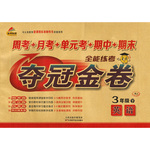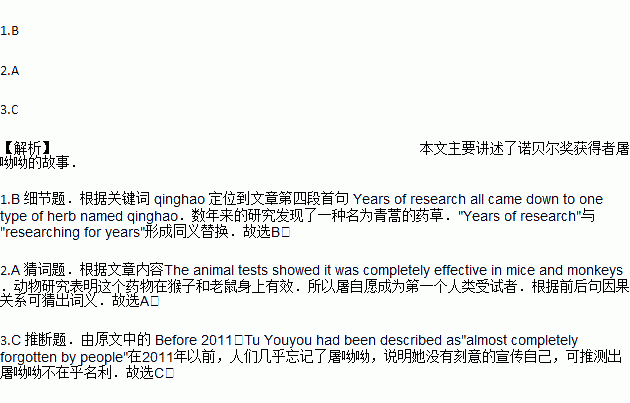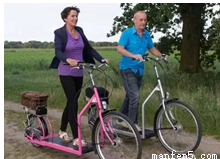题目内容
Tu Youyou, born in December, 1930, is a Chinese scientist and educator. She is best known for discovering artemisinin (青蒿素) used to treat malaria (疟疾), which has saved millions of lives. For her work, Tu received the 2015 Nobel Prize in Medicine.
Scientists worldwide had tried over 240, 000 medicines to treat malaria without success. In 1969, Tu Youyou, then 39 years old, decided to turn to traditional Chinese herbs(草药) for possible solutions. She looked into the Chinese medical classics in history, visiting traditional Chinese doctors all over the country on her own. She gathered her findings in a notebook, in which she recorded 640 methods of treating malaria. She and her team also experimented with over 2, 000 traditional Chinese herbs.
During this time, her husband was forced to work in the countryside, and their young daughter had to take care of herself in Beijing.
Years of research all came down to one type of herb named qinghao. The animal tests showed it was completely effective in mice and monkeys, So Tu volunteered to be the first human subject. “As head of this research group, I had the responsibility’ she said. It was safe with, her; so she continued to try it out with more human patients.
In 2007, her office was in an old apartment building in Beijing. Before 2011, Tu Youyou had been described as “almost completely forgotten by people1”, Yet in 2015, the Nobel Prize committee said her discoveries had given the world powerful new ways to fight a powerful disease which affected hundreds of millions of people every year. In terms of improving human health and reducing suffering, Mrs. Tu’s contribution is beyond words.
1.How did Tu Youyou find qinghao as a treatment?
A. By testing it on children. B. By researching for years.
C. By reading foreign books. C. By asking malaria patients.
2.What does the underlined word “effective” mean in Paragraph 4?
A. Successful. B. Useless. C. Unclear. D. Normal
3.What can we infer from the last paragraph about Mrs. Tu?
A. She couldn’t afford an apartment in Beijing.
B. She didn’t want her findings to be known.
C. She didn’t care much, for fame while researching.
D. She wasn’t able to describe her findings dearly
 夺冠金卷全能练考系列答案
夺冠金卷全能练考系列答案假如你是李华,你所在的城市出现“共享单车”,请写一篇倡导低碳出行的演讲稿,要点如下:
汽车 | 带来污染和拥堵 |
共享单车 | 不必担心存放和丢失 |
无污染,缓解拥堵,有利健康等 |
参考词汇
low-carbon 低碳的
air pollution空气污染的
reduce traffic jams 缓解拥堵
注意:1.可适当增加细节,使行文连贯;
2.词数 80-100;
3.开头己给出,不计入总词数。
Dear classmates,
The bright-colored public bikes—the Mobikes are now commonly seen on our city streets.


